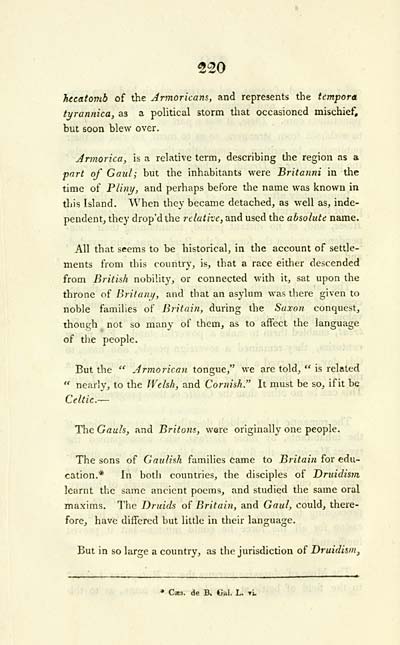Blair Collection > Celtic researches, on the origin, traditions & language, of the ancient Britons
(310)
Download files
Complete book:
Individual page:
Thumbnail gallery: Grid view | List view

^20
hecatomb of the Armoricam, and represents the tempora
tyrannica, as a pohtical storm tliat occasioned mischief,
but soon blew over.
Armorica, is a relative term, describing the region ns a
part of Gaul; but the inhabitants were Britanni in the
time of Pliny, and perhaps before the name was known in
this Island. When they became detached, as well as, inde-
pendent, they drop'd the relative, and used the absolute name.
All that seems to be historical, in the account of settle-
ments from this country, is, that a race either descended
from British nobility, or connected with it, sat upon the
throne of Brit any, and that an asylum Λνα5 there given to
noble families of Britain, during the Saxon conquest,
though not so many of them, as to affect the language
of the people.
But the " Armorican tongue," we are told, *' is related
" nearly, to the Welsh, and Cornish" It must be so, if it be
Celtic. —
The Gauls, and Britons, were originally one people.
The sons of Gaulish families came to Britain for edu-
cation.* In both countries, the disciples of Driiidism
learnt the same ancient poems, and studied the same oral
maxims. The Druids of Britain, and Gaul, could, there-
fore, have differed but little in their language.
But in so large a country, as the jurisdiction of Druidis/n,
• Caes. de B. Gal. L. tL
hecatomb of the Armoricam, and represents the tempora
tyrannica, as a pohtical storm tliat occasioned mischief,
but soon blew over.
Armorica, is a relative term, describing the region ns a
part of Gaul; but the inhabitants were Britanni in the
time of Pliny, and perhaps before the name was known in
this Island. When they became detached, as well as, inde-
pendent, they drop'd the relative, and used the absolute name.
All that seems to be historical, in the account of settle-
ments from this country, is, that a race either descended
from British nobility, or connected with it, sat upon the
throne of Brit any, and that an asylum Λνα5 there given to
noble families of Britain, during the Saxon conquest,
though not so many of them, as to affect the language
of the people.
But the " Armorican tongue," we are told, *' is related
" nearly, to the Welsh, and Cornish" It must be so, if it be
Celtic. —
The Gauls, and Britons, were originally one people.
The sons of Gaulish families came to Britain for edu-
cation.* In both countries, the disciples of Driiidism
learnt the same ancient poems, and studied the same oral
maxims. The Druids of Britain, and Gaul, could, there-
fore, have differed but little in their language.
But in so large a country, as the jurisdiction of Druidis/n,
• Caes. de B. Gal. L. tL
Set display mode to: Large image | Transcription
Images and transcriptions on this page, including medium image downloads, may be used under the Creative Commons Attribution 4.0 International Licence unless otherwise stated. ![]()
| Early Gaelic Book Collections > Blair Collection > Celtic researches, on the origin, traditions & language, of the ancient Britons > (310) |
|---|
| Permanent URL | https://digital.nls.uk/75767305 |
|---|
| Description | A selection of books from a collection of more than 500 titles, mostly on religious and literary topics. Also includes some material dealing with other Celtic languages and societies. Collection created towards the end of the 19th century by Lady Evelyn Stewart Murray. |
|---|
| Description | Selected items from five 'Special and Named Printed Collections'. Includes books in Gaelic and other Celtic languages, works about the Gaels, their languages, literature, culture and history. |
|---|

